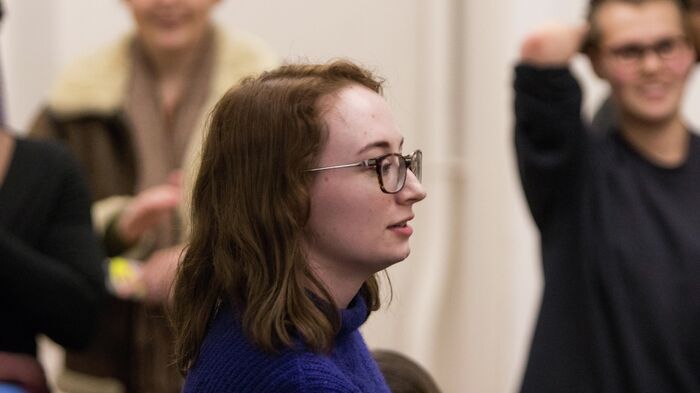
Ropek Hewson elected GU president following Cotton disqualification
The Elections Committee disqualified Joe Cotton for violating its Standing Orders despite him garnering the largest number of votes

The CUSU-GU Elections Committee (EC) has chosen to disqualify Joe Cotton from the GU presidential election, announcing Sofia Ropek Hewson as the provisional winner. The decision comes after the EC delayed the release of election results on Friday, when the outcomes of the other elections were revealed.
Cotton, who would have won the election had he not been disqualified, was disqualified because he used an iPad “to facilitate mobile voting and enable a larger turnout”, as he put it in a public statement following the EC’s ruling announcement, when encouraging students to vote in the elections.
Because these iPads were seen by the EC as mobile polling stations, this is in violation of the CUSU Standing Orders, Article G.10.viii, which reads: “no candidate or member of their campaign team, or any other person attempting to influence a voter may approach within three metres of the polling station except when they themselves are voting.” According to a statement from the EC, “insufficient steps were taken by Joe to provide space to those casting ballots on the iPad he had provided.”
In response to the ruling, Sofia Ropek Hewson told Varsity that she was “dismayed and frustrated by the lack of respect for the election rules and the democratic process repeatedly displayed by the other two candidates.”
Regarding the EC’s latest ruling, she said: “disqualification is the only sanction available to the Elections Committee that doesn’t also punish fairly run campaigns – the other possibility being voiding the election. We can’t possibly know for sure how many votes the candidate obtained in contravention of the election rules, thus disqualification seems just.”
Speaking about the elections results, she said: “I very much appreciate the support of everyone who voted for me, and, if the CUSU/GU Elections Committee decision is upheld, look forward to my role as Graduate Union President, and to continuing working with the graduate community.”
In a statement on the CUSU website, the EC wrote that it “notes that this rule may not have been sufficiently communicated to candidates in the candidates briefing” but made clear the expectation that candidates read CUSU’s Standing Orders, which are rules governing its day-to-day operations.
The EC’s statement also noted that it “wishes to highlight that it does not believe Joe intentionally attempted to coerce or intimidate voters due to this method.” They added: “We have made this decision based on the duty of the EC to apply the CUSU Standing Orders, which stand as they are based on the potential of this practice to influence voters, and the principle that voters must feel free to cast their ballots free from such influence.”
Cotton now has 48 hours to appeal the EC’s ruling. He confirmed his intention to appeal to Varsity, adding that he would be “appealing the decision, not as an egotistical move or an attack on the elections committee, but because I believe it is profoundly undemocratic to overturn the sovereign decision of the electorate on the basis of an inconsequential technicality.”
He continued: “I argue that it is inconsequential because in advance of the election result, I informed the Elections Committee that an estimated 88 votes were facilitated by my campaign in a way they argue is unconstitutional. Since the overall majority was 144, there are no grounds to say this alleged rules breach affected the outcome of the election”
This year’s elections saw a turnout of 1,128 voters. Cotton won 498 votes in the first round, compared to Ropek Hewson’s 349 and Guha Majumdar’s 239. In the second round, which saw Guha Majumdar’s votes transferred to Cotton and Ropek Hewson, Cotton won 574 to Ropek Hewson’s 430. After Cotton was disqualified, Ropek Hewson was declared the provisional winner with 498 votes to Guha Majumdar’s 295.
Guha Majumdar said: “I respect the mandate and the EC's decision. Congratulations Sofia!”
Today’s ruling follows numerous violations of election rules over the course of the GU campaign. The EC issued a formal warning to Guha Majumdar after his campaign sent unsolicited emails, and it later called him for a disciplinary meeting, a more severe punishment, after supporters of his campaign removed the campaign materials of his opponents. Joe Cotton also received a formal warning for an unrelated incident in which Wolfson College communications posted in support of his candidacy, breaching a rule which restricts endorsements to individuals and societies.
In light of today’s rulings, Cotton said, referring to one of his campaign promises: “I told you I’d make the GU more visible.”

All the election news, in one place
Comprehensive news and analysis on the CUSU/GU elections, collected.
Visit Varsity’s Elections 2018 hub.
 Comment / Cambridge’s tourism risks commodifying students18 April 2025
Comment / Cambridge’s tourism risks commodifying students18 April 2025 News / Cambridge student numbers fall amid nationwide decline14 April 2025
News / Cambridge student numbers fall amid nationwide decline14 April 2025 News / Greenwich House occupiers miss deadline to respond to University legal action15 April 2025
News / Greenwich House occupiers miss deadline to respond to University legal action15 April 2025 Comment / The Cambridge workload prioritises quantity over quality 16 April 2025
Comment / The Cambridge workload prioritises quantity over quality 16 April 2025 Sport / Cambridge celebrate clean sweep at Boat Race 202514 April 2025
Sport / Cambridge celebrate clean sweep at Boat Race 202514 April 2025





